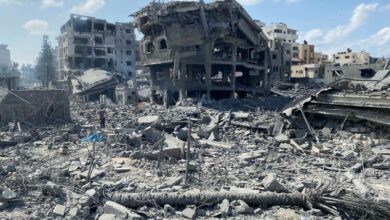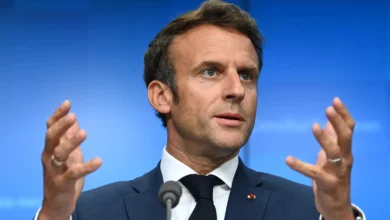A confirmed tragedy in the unlikely WWIII recipe

World War III ingredients:
In response to a question about the escalation of violence in the Middle East, President of Belarus Aleksandr Lukashenko said that World War III may start from Middle East. What President Lukashenko got right is that we have a good recipe for global war but what he missed is that due to pragmatic reasons the recipe may not be served after it is set on fire.
Though the U.S. is the only superpower which is explicitly involved indirectly in the conflict, the involvement of other important regional actors in the war like Egypt, Turkey and Iran may drag the other important superpowers like Russia and China into the conflict. This scenario is possible but very unlikely because it will be dictated by a succession of other unlikely events.
Iran’s further involvement in the ongoing war in Gaza is likely to consist in deploying loyal groups in Lebanon, Yemen, Irak, and Syria to escalate their pressure on Israel. If the latter goes undeterred in its plan to remove Hamas from power in Gaza, it is likely to be at open warfare against these actors, besides the less probable involvement of Syrian regular forces. The latter’s involvement is largely dependent on a deal with the Turkish to handcuff their allies in Idlib to set the Syrian army free. Syria also harbours Iranian bases and foreign fighters loyal to the Iranian axis.
The U.S. naval presence in the region is meant to respond to this scenario, that is, the U.S. is in the Middle East to prevent a “wider war from erupting,” according to the official U.S. narrative, and to prevent Iran from interfering according to the logic of U.S. interests.
Yet, the U.S. is not the only actor in this war that has interests to defend. Since the early days of the war, the Iranians made it clear that their direct involvement in the conflict will be dictated by threats to their interests.
Organizations like Hamas, Hizbollah, and the Houthies harbour these interests and if they turn into third parties to be wiped out by Israel after Hamas, that scenario is likely to rhyme with wiping out Iranian interests in the region.
Egypt has no interest in Israel wiping out Hamas and controlling the Rafah Border Crossing. The peace treaty with Israel does not go beyond papers into men’s hearts. Israel is a former enemy and has a strong army Egypt is not interested in sharing borders with. In Egypt, the dominant interpretation of Israel’s aggressive conduct in Gaza is that the Israelis are trying to force Gazans to flee to Egypt, thus plunging the North African nation into a refugee crisis. Egypt’s deployment of its army near Sinai and its military parades amid pressure on it to receive refugees from Gaza is no fluke.
Ideological Division:
Ideology, a main fuel of global, regional, and civil warfare, was put on the table when a dangerous division of the world into civilized and uncivilized powers was made frequently by Israel’s PM Benjamin Netanyahu in the presence of some Western leaders who made successive pilgrimages to Tel Aviv to express support to Israel- a dichotomy that resonates with the “sons of darkness” vs. the “sons of light” metaphor he made on the eve of the deadly attack on Al Ahli hospital compound, which left 500 dead, before deleting it from his X account after the attack.
The initially unequivocal support of some Western political actors to Israel irrespective of its vengeful campaign in Gaza which has so far claimed 8000 victims and regardless of its civilisation war disocurse – exemplified in The joint statement released by the US, UK, France, Germany, Italy and Canada, in which they reaffirmed their support for Israel’s “right to self-defense against terrorism,” without alluding to the plight of Palestinians – amounted then to endorsement of Israel’s violent actions besides it religious interpretation of the conflict in the Middle East, and therefore, it was drawn upon by President Erdogan of Turkey on October 28, 2023, when he said the West is pushing the world into a religious war.
Israel’s religious division of the world into the sons of light and those of darkness is often secularized into a division of the world between democracy and authoritarianism by some of Israel’s supporters – a dichtomy at the heart of the double standard with which human plight in the Middle East is treated.
There will be no religious World War III but there is a tragedy:
This global war is unlikely at least in the short run due to the unwillingness of most regional actors to escalate the war and to export it to Palestine’s neighbours and due to Western pragmatism, which I have always seen as the engine of Western progressivism.
Iran has no interest in giving Israel and the U.S. an excuse to strike it. Hezbullah has no interest in ending the almost two-decade-long peace in Southern Lebanon for a deadly war against Israel that can give arguments to the party’s Lebanese and foreign detractors to call the existence of its armed wing into question.
Syria is still recovering from a decade long civil war and Egypt has one of the most strangling economic crises in the world and war can only exacerbate it.
It is Western pragmatism which has shown a great adaptability to the fluctuations of a constantly changing world, not Capitalism as many have claimed. From the decolonization of former colonies to Keynesian economics and the endorsement of the values and demands of the Civil Rights Movement by the U.S. establishment, modern history teaches us that the West has no problem acknowledging its mistakes when they risk leading government and society to an impasse and adopting its discourse accordingly when the ideological motives behind miscalculated policy are exhausted.
Out of pragmatism, the U.S. is not interested in one more war in the Middle East where stability is crucial for its vital interests in the region. Also, out of pragmatism, the other Western actors who rushed to express their support to Israel will soon realize that Israel’s deadly genocide in Gaza is hard to justify to a rapidly growing opposition to Israel’s reckless conduct in the Middle East.
Just as it has benefitted the U.S. uphold its world hegemony, Globalization has allowed the Palestinians to find alternative channels to traditional Western media to make their plight known to a large Western audience, and therefore, none of the concerned parties in the Middle East conflict is interested in seeing this world fall apart.
Tragedy:
Human tragedy should not be reflected upon as much as it should be empathized with. Tragedy is a main component of global war recipes, history tells us. Yet tragedies today can find their way through censorship into human hearts, forcing perpetrators to face shame and embarrassment.
The most embarrassing tale which is going out of control for Israel’s unconditional supporters in the West is Israel standing at odds with Western values. Occupation and its consequent violations of human rights contradict the value the West has claimed it stands for the most: freedom. Israel’s ongoing occupation of internationally recognized Palestinian territories violates the principles of the 1948 Universal Declaration of Human Rights and its subsequent legally binding covenants and treaties
Systemically targeting hospitals is another unprecedented violation of International Humanitarian Law. On October 29, Al-Quds hospital, home to bed-ridden patients with serious chronic disease, refugees, and people wounded in the bombings, was ordered to evacuate. Reports by journalists on the ground say the surroundings of several hopsitals, including the Indonesian hopsital, the Turkish hospital, and Al-Shifa have been heavily bombed in such a manner as to both warn the hospitals’ staff and cause damage inside.
Truth shall Prevail:
In 2016, Tony Blair expressed regret over the Iraq War decision in 2003, and sooner or later, even the most committed allies of Israel will realize the scale of the moral dilemma their rushed unconditional support to Israel at the beginning of hostilities has put them in. Then, they will set their Western pragmatism, which I equate with Western progressivism, in motion to find an exit from the dilemma between supporting Israel’s aggressive actions and finding a moral justification for them.
They might stick to the usual “collateral damage” argument just as they might say, “the events were too swift to allow for a reasonable and balanced judgement.” Other repentance mantras might involve statements in the like of “we were misled by wrong figures,” or circumstancial confessions like, “the events that took place then need to be understood in their context.”
The growing scale of pro-Palestine demonstrations around the world (On Saturday, October 28, almost 500000 people protested in London in support of Palestinian rights, according to Aljazeera Arabic) is making it hard to censor the Palestinian plight from the screens.
The images of agonising toddlers and children, of bereaved and wounded parents, of torn apart little bodies, and of tears mixed with blood on the cheeks of little kids have already circulated on the social media- they have already been etched in our collective memories for decades to come- and the screams of little kids under the tons of rubble have been too loud to forget or to contain through censorship. These demonstrations are expected to grow in size and scale with the looming spectre of a wider ground operation and with Israel shelling the surroundings of other hospitals mainly Al-Shifa, Al-Quds, and the Indonesian hospital.
The way some of Israel’s allies and friends in the West have mitigated over the last week their peviously unconditional support to Israel stands witness to that fact that these growing demonstrations are starting to affect policy and to the fact that a slow mass killing is taking place.
On October 29, Britain and France who have been Israel’s main supporters in Europe expressed concern about getting aid inside Gaza, and on Otober 30, 2023, Roberta Metsola called for a humanitarian truce in Gaza, according to AlJazeera. Few days earlier, EU leaders issued a “call for ‘humanitarian corridors and pauses’ in Gaza after hours of wrangling.” This wrangling is evidence to the political embarrassment some EU political actors are dealing with, in a manner that shows that marginal honest voices like that of Josep Borrel in the early days of the conflict are finding evidence in Gaza to prevail and sound louder.
U.S. officials are moderating their permissive tone with regards to Israel’s reckless behavior with the White House welcoming the restoration of communications to Gaza on October 29, a day after the strip was cut off from the world, and US National Security Adviser Jake Sullivan saying hospitals should not be targeted under International Humanitarian Law.
Compressing over 2 million people in an area of 365 km², the Gaza strip is one of the most densely populated areas in the world. Shelling such a densely populated area in an indiscriminate manner is nothing less than mass killing.
It has been there for a long time:
Restrictions on food and medical supplies, fuel, electricity, and water did not begin with the ongoing war. For years, the average Gazan has struggled to make ends meet within a closely scrutinized blockaded piece of land. Recurrent shortages, poverty and unemployment, besides Israeli occasional bombardment of the strip in retaliation for occasional Hamas rockets have taken their toll on Gazans.
Gaza’s only exit into the external world is the Rafah Border Crossing, but making it through this border has been subject to strict conditionality for years. Making it back inside Gaza is no easier task. In 2008 and 2014 two deadly wars took place in the Gaza strip.
Israel’s disputes with the Palestinians have involved issues originating in the West Bank including evacuations of Palestinians from their homes, land confiscations, vengeful house demolitions, continuous settlement building far beyond the internationally recognised 1967 border, occupation, settler and IDF provocations, police brutality, attacks on places of worship, arbitrary arrests, and the shooting of demonstrators. In the West Bank these violations of human rights were committed by Israel in the absence of the Hamas pretext, as renowned Egyptian star Bassem Youssef argued in a famous interview with Morgan Piers.
These policies were meant to buy time so as to gradually dissolve the Palestinian cause into a wider narrative about a thriving and unique democracy in the region until the screams of children provided a loud refutation.
Today, even the U.S., Israel’s longstanding supporter, is again calling for a two-state solution. Western pragmatic adaptability to change is, in my opinion, the key to its progressive legacy. Just as Canada recognized the tragedy of residential schools and the United States acknowledged the segregation its black people had been subjected to in the 1960s, sooner or later, those who supported Israel uncondtionally at the beginning of its bombing of Gaza and those who are still expressing the same support will acknowledge they were at some moment on the wrong side of history.




